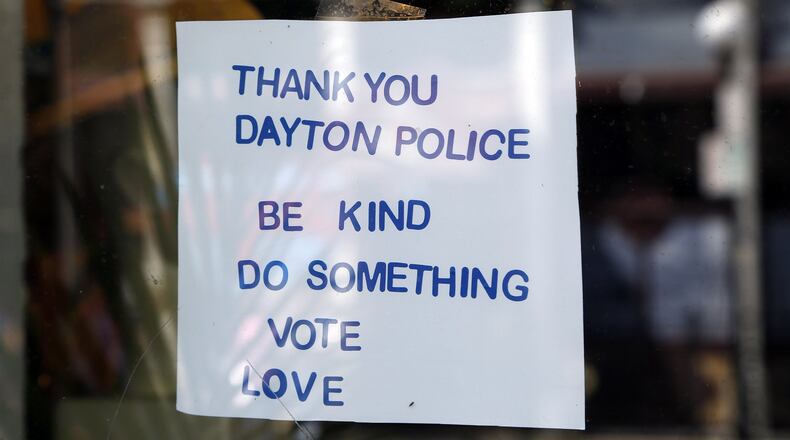“As a group they are doing well,” Platoni said. “But this has taken a tremendous toll. This is difficult to deal with even for the most seasoned police officer.”
Dayton City Manager Shelley Dickstein said she has checked in with the police officers who engaged Connor Betts, 24, to encourage them to be mindful of their mental health and to use available resources.
She said she’s talked with officers to find out if they are talking to each other and to ensure they have an adequate support network.
“The first thing I did was check in with officers on administrative leave to make sure they know how much we appreciate them and making sure they have support,” she said.
Dickstein said the city is talking to other staff who responded to the crime scene, including officers and medics who administered CPR, applied tourniquets and provided support.
Help available right away
Platoni got a call about the shooting at 2:45 a.m. the day of the shooting that killed nine people, plus the shooter, and left 17 with gunshot injuries. Platoni — who survived the Fort Hood, Texas mass shooting in 2009 — was in Columbus on active duty with the Ohio Military Reserve at the time, but was released to come help first responders in Dayton.
She got into town around 4 a.m. and was talking with first responders by 4:30 a.m. She wasn’t the only mental health help, though.
Steve Click, first responder liaison for the Ohio Department of Mental Health and Addiction Services, said the state helped get first responders in contact with mental health resources by 6 a.m.
“The Montgomery County Addiction and Mental Health Board had mental health clinicians available right away. First responders had to opportunity to talk with someone, to process, before they even went home,” Click said. “Most of the time first responders have to wait a day or two to get those services.”
Click also said the way the Dayton community rallied around first responders and thanked them for their actions has helped in the coping process.
“A lot of first responders wonder if they are the only one feeling certain things or if they did the right thing,” Click said. “It is important to let them know what they’re feeling is a normal reaction to an abnormal circumstance. This is normal for them right now.”
Anyone “even remotely involved” after the shooting went through a “defusing” session, Platoni said. The defusing process aims to help people to be able to walk through the crisis and explore what happened. Participants are also given information on how to cope with stress and where to seek help.
Platoni said it is too early to be certain, but it is a possibility that some first responders may develop PTSD because of this incident. Many first responders are experiencing lingering effects on their sleep and feelings that something like this could happen again.
“These sessions aren’t meant to prevent PTSD, but to allow first responders to go back to work with a healthier mindset,” Platoni said.
Survivors’ guilt felt
Staff across the city are experiencing trauma because the shooting is another significant crisis that has shaken the organization, Dickstein said. Planning safety and security measures for a Ku Klux Klan rally in May took extensive time for city workers, and days later, a series of tornadoes hit the area, including the northern section of Dayton.
“This one is particularly horrific because you never want to be a community that has a mass shooting, and you don’t have to be at the event to be traumatized,” Dickstein said.
There is a great deal of survivors’ guilt in the community and across city government among people who were there that night but were not harmed or who thought about going out but did not for whatever reason, Dickstein said.
Many people witnessed the crime scene in the aftermath of the shooting and “cannot unsee” the terrible things they saw, and it’s important to make sure they have someone they are talking to help process their feelings and emotions, Dickstein said.
Dickstein said city staff are physically tired from responding to emergencies and working long hours, and she’s giving workers permission to take time off to recharge.
“It’s about giving people the permission, because a lot of times we are very passionate and committed to this work and are so wrapped up in the job that we don’t take care of ourselves,” she said. “As a leader in this organization, it’s really important for me to give people permission.”
Dickstein said she sent out a video clip to all city staff that emphasized importance of mental health and self-care and the city resources to help staff in these areas.
“You can’t care for others if you can’t care for yourself,” she said.
HOW TO GET HELP
If you are struggling after the Oregon District shooting, you can seek help here:
Samaritan CrisisCare
If you need immediate mental health assistance, call Samaritan CrisisCare at 937-224-4646.
Ellis Institute
Free walk-in mental health first aid services are also available at Wright State’s Ellis Human Development Institute for adults affected by the mass shooting in Dayton.
The Ellis Institute, at 9 N. Edwin C Moses Blvd., Dayton, is offering free services 1 to 4 p.m. Mondays; 1 to 4 p.m. Tuesdays; and 11 a.m. to 2:30 p.m. Fridays. Call Ellis at 937-775-4300.
Reach Out Clinic
The Reach Out Clinic, 25 E Foraker St, Dayton, next to Miami Valley Hospital, has free walk-in services 5 p.m. to 8 p.m. Thursdays. You can contact Reach Out at 937-258-2000 with questions.


